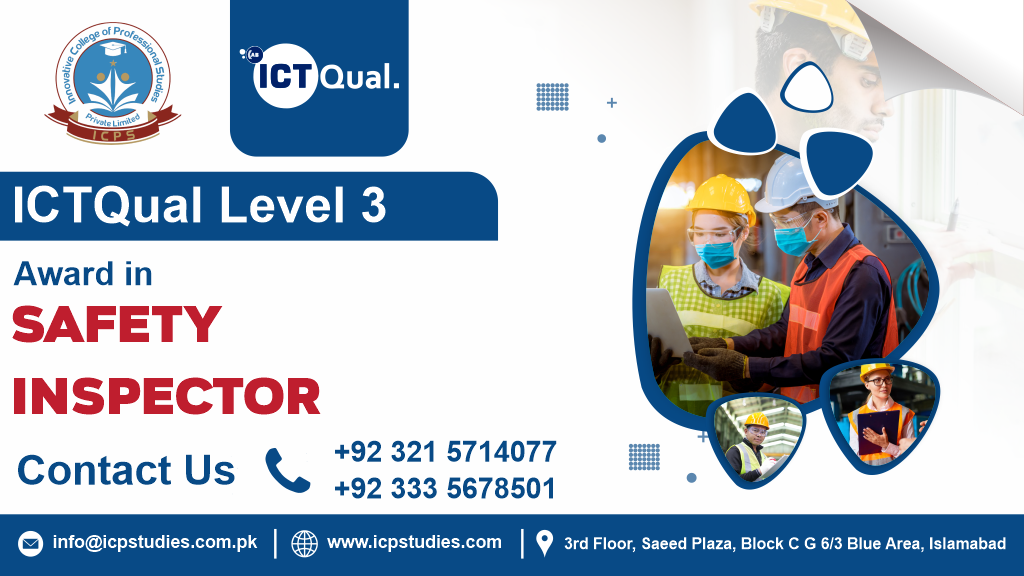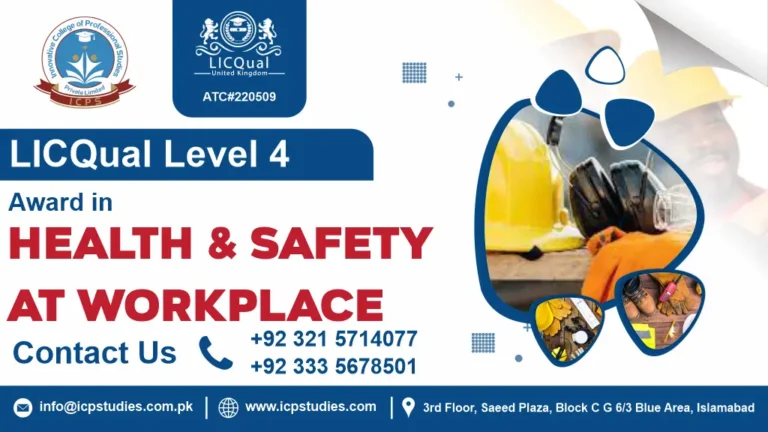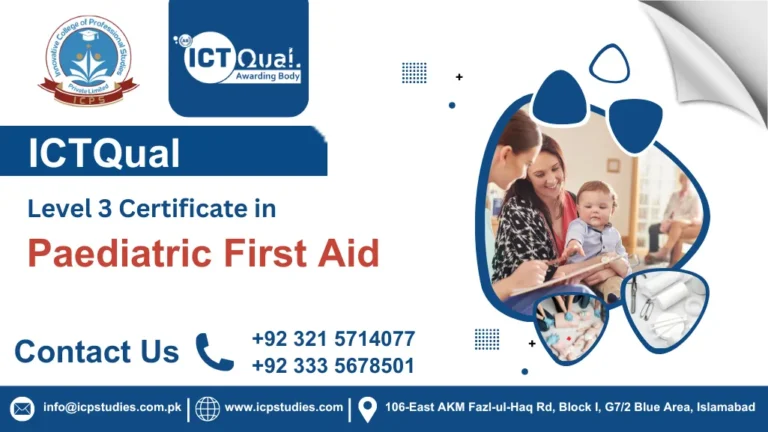In today’s dynamic work environments, ensuring safety and compliance is more critical than ever. The Level 3 Award in Safety Inspector is a prestigious qualification designed to enhance the skills and knowledge of safety professionals. Whether you’re already working in safety management or looking to transition into this vital field, this award provides the advanced training necessary to excel. Here’s why this qualification is essential and how it can elevate your career in safety inspection.
The Level 3 Award in Safety Inspector is a specialized qualification that focuses on developing advanced skills in safety inspection and management. It equips professionals with the tools and knowledge needed to effectively assess and manage health and safety risks in various work environments. This qualification is aimed at individuals who are responsible for ensuring compliance with safety regulations and improving safety standards within their organizations.
The Level 3 Award in Safety Inspector is more than just a qualification; it’s a critical investment in your professional development and a significant step towards enhancing workplace safety. By acquiring advanced skills in safety inspection, management, and compliance, you can contribute to a safer working environment, advance your career, and ensure that your organization meets all regulatory requirements.
All About ICTQual Level 3 Award in Safety Inspector
Course Overview
The Level 3 Award in Safety Inspector is a specialized qualification designed to enhance the skills and expertise of individuals involved in safety inspection and management. This advanced certification focuses on equipping professionals with comprehensive knowledge and practical skills required to effectively manage and ensure safety compliance within various work environments.
Level 3 Award in Safety Inspector is a crucial qualification for professionals aiming to advance their careers in safety management. It equips them with the skills and knowledge needed to conduct effective safety inspections, manage risks, and ensure compliance with safety regulations, ultimately contributing to a safer working environment.
Study Units
- Introduction to Health and Safety
- Legislation and Regulations
- Risk Assessment
- Hazard Identification
- Conducting Safety Inspections
- safety Management Systems
- Reporting and Documentation
- Emergency Procedures
- Communication and Training
To enroll in the ICTQual Level 3 Award in Safety Inspector, participants typically need to meet the following requirements:
- Age Requirement: Participants should be at least 18 years old.
- Basic Literacy and Numeracy: A good understanding of English, along with basic literacy and numeracy skills, is essential for completing the course.
- Relevant Experience: Prior experience in health and safety, risk management, or related fields is beneficial.
- Knowledge of Health and Safety Regulations: Familiarity with relevant health and safety legislation and standards is advantageous.
- Course Registration: Participants must register for the course through an accredited training provider.
- Payment: Course fees must be paid as required by the training provider.
- Commitment to Attend: Participants should be prepared to attend the full duration of the course and complete any required assessments to receive certification.
Always check with the specific training provider for any additional or varying requirements.
The ICTQual Level 3 Award in Safety Inspector is designed for:
- Health and Safety Professionals: Individuals responsible for monitoring and enforcing safety standards in various environments.
- Safety Inspectors: Current inspectors looking to enhance their skills and knowledge in conducting safety audits and assessments.
- Managers and Supervisors: Those overseeing teams who need to ensure compliance with health and safety regulations.
- Compliance Officers: Professionals responsible for ensuring that organizations adhere to health and safety laws and guidelines.
- Construction and Site Managers: Individuals working in construction or industrial settings who need to prioritize safety and compliance.
- Anyone Pursuing a Career in Safety Management: Individuals interested in developing a career focused on health and safety inspection and management.
This course provides participants with the knowledge and skills necessary to effectively conduct safety inspections, identify hazards, and promote a culture of safety in the workplace.
Learning Outcome
. Introduction to Health and Safety
Learning Outcomes:
- Fundamental Principles: Understand the core principles and concepts of health and safety management, including the importance of maintaining a safe working environment.
- Roles and Responsibilities: Identify the roles and responsibilities of various stakeholders in health and safety, including employers, employees, and safety professionals.
- Safety Culture: Recognize the impact of a positive safety culture on organizational performance and employee well-being.
- Key Terminology: Familiarize with essential health and safety terminology and its application in different contexts.
2. Legislation and Regulations
Learning Outcomes:
- Legal Framework: Gain a comprehensive understanding of the relevant health and safety legislation and regulations, both nationally and internationally.
- Compliance Requirements: Identify and interpret compliance requirements for different industries and workplaces.
- Legal Obligations: Understand the legal obligations of employers and employees concerning health and safety.
- Enforcement and Penalties: Learn about the enforcement mechanisms and potential penalties for non-compliance with health and safety regulations.
3. Risk Assessment
Learning Outcomes:
- Risk Assessment Process: Understand the steps involved in conducting a risk assessment, including hazard identification, risk evaluation, and control measures.
- Risk Evaluation: Evaluate risks based on their likelihood and potential impact, and prioritize them accordingly.
- Control Measures: Develop and recommend appropriate control measures to mitigate identified risks.
- Risk Assessment Documentation: Prepare and maintain accurate documentation of risk assessments for review and compliance purposes.
4. Hazard Identification
Learning Outcomes:
- Types of Hazards: Identify various types of hazards, including physical, chemical, biological, and ergonomic hazards.
- Hazard Detection Techniques: Apply techniques and tools for detecting and assessing hazards in different work environments.
- Hazard Reporting: Learn the procedures for reporting identified hazards and ensuring they are addressed promptly.
- Preventative Actions: Develop strategies for preventing and minimizing the impact of identified hazards.
5. Conducting Safety Inspections
Learning Outcomes:
- Inspection Procedures: Master the procedures for conducting thorough safety inspections, including planning, execution, and follow-up.
- Inspection Tools: Use appropriate tools and checklists to ensure comprehensive safety inspections.
- Identifying Deficiencies: Detect safety deficiencies and non-compliance issues during inspections.
- Corrective Actions: Recommend and oversee the implementation of corrective actions to address identified safety issues.
6. Safety Management Systems
Learning Outcomes:
- System Components: Understand the components and structure of effective safety management systems.
- Implementation: Learn how to implement and maintain a safety management system tailored to the specific needs of an organization.
- System Evaluation: Assess the effectiveness of safety management systems and make recommendations for improvements.
- Continuous Improvement: Apply principles of continuous improvement to enhance the safety management system over time.
7. Reporting and Documentation
Learning Outcomes:
- Documentation Standards: Learn the standards and practices for documenting safety inspections, risk assessments, and incident reports.
- Reporting Procedures: Understand the procedures for reporting safety issues, incidents, and compliance status to relevant stakeholders.
- Record-Keeping: Maintain accurate and up-to-date records for safety management and regulatory compliance.
- Communication of Findings: Develop skills for clearly communicating safety findings and recommendations through written reports.
8. Emergency Procedures
Learning Outcomes:
- Emergency Planning: Understand the key elements of effective emergency planning and response procedures.
- Emergency Response: Learn how to coordinate and manage emergency response activities, including evacuation, communication, and first aid.
- Drills and Exercises: Implement and evaluate emergency drills and exercises to ensure preparedness and effectiveness.
- Incident Management: Develop skills for managing and mitigating incidents during emergencies, including post-incident review and analysis.
9. Communication and Training
Learning Outcomes:
- Effective Communication: Develop skills for communicating safety information clearly and effectively to different audiences.
- Training Techniques: Learn techniques for delivering safety training and workshops to employees and stakeholders.
- Feedback Mechanisms: Implement feedback mechanisms to assess the effectiveness of safety training and communication efforts.
- Engagement Strategies: Use strategies to engage employees and encourage their active participation in safety initiatives and training programs.
FAQs about ICTQual Level 3 Award in Safety Inspector







